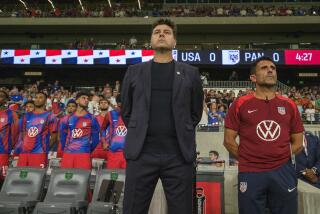Brazil’s veteran core exposes U.S. men’s inexperience in international friendly
- Share via
Reporting from EAST RUTHERFORD, N.J. — A young, inexperienced U.S. national team took its first unsteady steps toward the next World Cup on Friday. And while those baby steps weren’t always effective or attractive, they were important simply because they got the journey started.
That the U.S. lost its first game of the new World Cup cycle to Brazil — 2-0 before an announced crowd of 32,489 — wasn’t a surprise. The Americans have lost 11 straight to Brazil, a national team record.
But this team is measuring progress in ways that don’t show on the scoreboard.
“We’re earning stripes, man,” said Wil Trapp, who wore the captain’s armband in just his seventh appearance for the national team. “This is a game where lessons are learned and they’re learned harshly.
“So understanding that we’re only going to get better and we’re only going to improve from playing difficult opponents is a big step for us.”
Brazil, after all, is trying to maintain a level of play that has seen it make six straight trips to World Cup quarterfinals or beyond. The U.S. is trying to rebuild after missing the tournament for the first time in 32 years.
The differences in the players they fielded Friday was great as well.
Brazil’s 11 starters all came from major European clubs; the U.S. lineup included four MLS players. Thirteen Brazilian players were on the team that made it to the World Cup quarterfinals this summer; 16 U.S. players entered the game with fewer than eight international caps.
And while the average age of the U.S. players was 23, no Brazilian starter was younger than 24. Yet the Americans didn’t back down.
“One of the things I’ve noticed in this group is that they don’t lack confidence,” said interim coach Dave Sarachan. “They still feel like, ‘OK, let’s get on with it.’ That’s an important mentality for this group.”
Brazil didn’t need much time to break U.S. down, though, with Roberto Firmino losing his defender and tapping in a Douglas Costa cross in the 11th minute. Costa made the play, taking what appeared to be a harmless pass from Marquinhos near the sideline high in the U.S. end, then outrunning Antonee Robinson up the right wing. After cutting toward the penalty area he delivered a perfect feed to Firmino, who had peeled away from Matt Miazga as he entered the six-yard box.
His right-footed finish was as easy as it was effective.
The U.S. nearly tied the score with a dangerous flurry late in the first half that included a corner kick just out of the reach of a soaring John Brooks, a Miazga header that was blocked in front and a Weston McKennie shot off a scramble that went right at Brazilian keeper Alisson.
That would be as close as the young Americans would get to making this friendly a game. When Neymar doubled Brazil’s advantage on a penalty kick in the 44th minute, the outcome was no longer in doubt.
Brazil also dominated statistically, building a wide lead in time of possession and putting twice as many shots on goals.
“It was a learning experience,” Robinson repeated. “We’re still a young team. We’re still getting to know each other. We haven’t played many games together.
“Every game, we’ll take something from it. It’s just more experience.”
The U.S. will probably continue to take its lumps while gaining that experience because it’s not playing a soft schedule. Before meeting Brazil the Americans played a French team that, five weeks later, would win the World Cup. Its next four opponents – Mexico, Colombia, Peru and England — all played in the last World Cup, unlike the U.S.
“You want to challenge yourself against the best competition,” Sarachan said.
“You learn from mistakes. I’d rather be playing these games than play a weak team. We don’t like to lose, but there’s lessons in losing.”
[email protected] | Twitter: @kbaxter11







